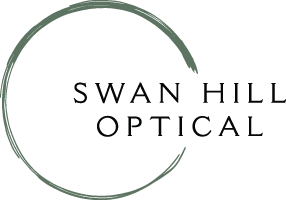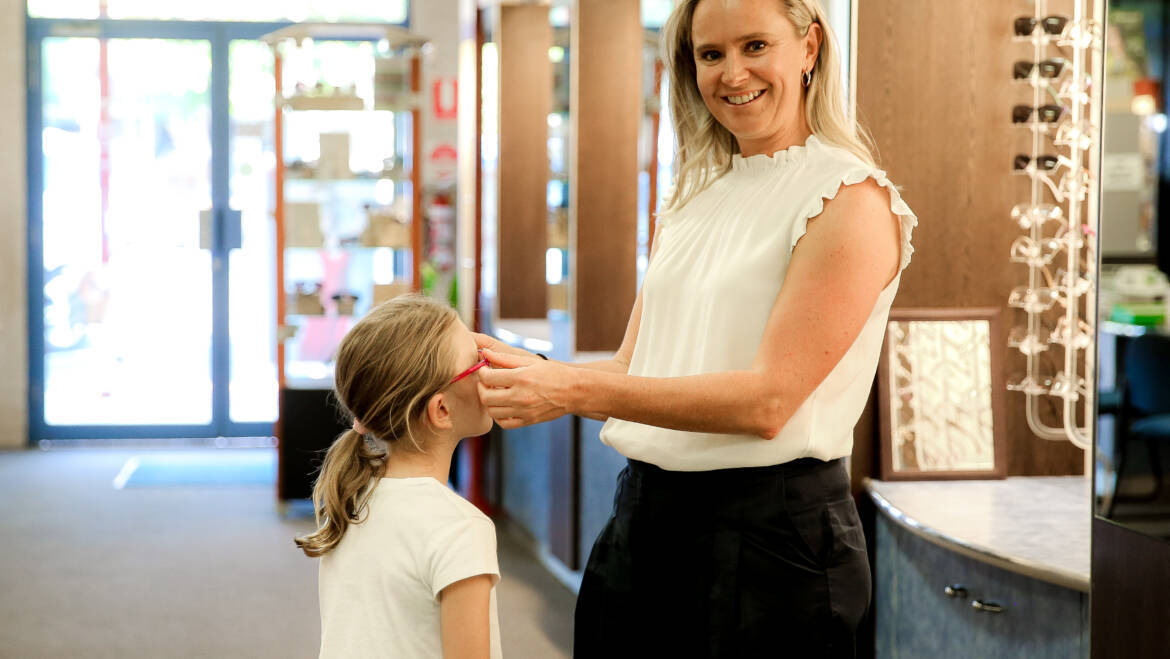Pictured: Swan Hill and Kerang Optical optometrist Jenalle Pye
Swan Hill and Kerang Optical’s local and dedicated optometrist, Jenalle Pye speaks about her experience servicing one of our main senses – our eyes – for the past 15 years. Revealing that her role isn’t always just about examining the eyes, she has also had many a laugh and shed plenty of tears with her patients.
With more insight to what goes on behind the doors of Swan Hill and Kerang Optical, here’s Jenalle.
Q. How long have you been an optometrist at Swan Hill and Kerang Optical, and what has it been like?
I have been practicing at Swan Hill and Kerang Optical for the past 15 years, and at the start of 2019, took over the ownership of both practices together with practice manager and dispenser Kristy Burney. I love that I have the opportunity to see and help patients as young as newborn babies, to over 100 years in age.
Country people appreciate continuity of care with their health professionals, and over the years I am proud to have established strong relationships with my patients, cared for many wonderful people from different backgrounds, and watched them progress through different stages of life.
I believe that understanding the members of our community and what their needs are is an important part of being able to do my job well.
Q. Why did you want to become an optometrist?
My mother is a high myope (short sighted) and an incredible country community-minded health professional. My brother is partially blind and I too am a high myope.
Inspired by my mother’s work, and through childhood experiences with eye health professionals, I wanted to combine my love of medical science with working and helping country people. An optometrist is the perfect combination of these interests.
Q. What schooling did you undertake?
I grew up on a dairy farm in South Gippsland, and after secondary school I completed a Bachelor of Science with first class honours at The University of Melbourne.
Following several years working as a research scientist in the diabetes field, I returned to Melbourne University to complete an additional four years of study to gain a Bachelor of Optometry. I have been practicing at Swan Hill and Kerang for the past 15 years.
Q. What is the best thing about optometry?
Vision is an important part of our lives, and something that can easily be taken for granted. What I love is that with very small changes, I can make a massive impact on someone’s quality of life.
That can be through providing children with clear and comfortable vision so that they can learn and develop at school, putting a teenager into contact lenses so they can play sport with full visual function, monitoring and treating eye diseases without having to refer patients to the closest ophthalmologist 200km away, enabling people to meet driving standards and maintain a drivers license, to providing the community with high quality frames and lens options for their glasses to ensure their visual needs are met.
I have the privileged opportunity to protect what is arguably our most valued sense.
I feel incredibly proud that our clinics are able to provide a complete eye health service to our community, despite our relative location.
Q. Have you noticed a change in optical needs as time has progressed? Maybe in terms of advancement in technology impacting our eyes everyday?
Patients visual needs have certainly become more demanding over the past few years, with the rapid increase in device use. To fixate on a screen for work or pleasure places not only demand on the eyes, but our neck, shoulders and body posture in general.
Our eyes prefer to focus about six meters away, so fixating on a device screen makes our eyes work harder and leads to digital eye strain.
Glare emitted from the screen also makes extended viewing uncomfortable, and we tend to blink far less when using digital devices.
Symptoms of digital eye strain include eye discomfort, blurred vision, headaches, red and tired eyes, and disrupted sleep cycles.
Unfortunately, I have seen an increase over the past 12-18 months with Covid restrictions, home schooling and working from home via meetings held on Zoom or another form of screen platform, people between the ages of seven to forty years of age presenting with such symptoms due to the excessive screen time. Excessive screen time is also linked to an increase in the number of children developing myopia or poor distance vision.
Eighteen months prior this was a rarity unless there was a family history.
Over the past month, we’ve seen more than one child a week present with blurry distance vision that has arisen from excessive screen time.
This phenomenon has become so common worldwide that the World Health Organisation has now listed myopia as a priority eye health disease.
Q What do you want the general community to realise or be advised about with their eyes?
I think most people would agree that good vision is an important element in living a healthy and happy life.
Vision problems and eye diseases can occur at any age, and this is why regular eye examinations with an optometrist are advised.
Many people take their vision for granted until something goes wrong, and unfortunately some conditions can be silent until it’s too late to treat.
With over 90% of vision loss being preventable or treatable if detected early, it’s easy to have a bulk billed eye examination to check your eye health.
At Swan Hill and Kerang Optical, we use the latest in diagnostic equipment and technology to ensure the highest quality of eyecare is provided, and quality of life maintained from a visual perspective.
Q. What is a common eye question you receive?
I often get asked about floaters, or spots floating in front of a patient’s eyes. These are harmless in many cases, but can also be symptomatic of a more serious condition such as a retinal bleed or detachment.
It is always recommended to have an examination if such symptoms develop.
Q. What is a common eye joke you receive?
No jokes as such (that can be published anyway!) but I love it when couples come in together and laugh at what their partner can’t see on the vision chart….until it is their turn and the roles are reversed.
Q. When you’re not treating peoples’ eyes, what do you like to do in your spare time?
In my spare time, I can’t go past experiencing good food and drinks with family and friends.
I thoroughly love coaching junior netball, umpiring and even having a run around the netball court myself.
We are fortunate to live on beautiful Lake Boga, and my husband, four children and I enjoy swimming, water-skiing and boating during the summer and autumn.

